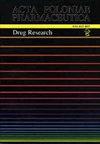Expression of paraoxonase 1 in HEK293 cells and its effect on lactonase and arylesterase activity in samples containing human serum and/or prooxidant or antioxidant agents - a preliminary study
IF 0.4
4区 医学
Q4 PHARMACOLOGY & PHARMACY
引用次数: 0
Abstract
Expression of recombinant paraoxonase 1 (PON1) in the human embryonic kidney (HEK293F) cell line was evaluated. Two recombinant human PON1 proteins were investigated: PON1-Fc, which has an Fc-tag on its C-terminal, and His-PON1-Fc, which has an Fc-tag on its C-terminal and histidine on its N-terminal. The influence of high and low-density lipoproteins, copper ions, iron ions, and thiolactone homocysteine, on arylesterase and lactonase activities of PON1 in human serum was examined. Two activities of PON1, arylesterase and lactonase, were measured using earlier elaborated kinetic spectrophotometric method with temperature control at 37°C using the water thermostated cuvette holder. It was demonstrated that the HEK293F expression platform is useful for obtaining recombinant human PON1 protein. Also, addition of high-density lipoprotein increased serum arylesterase and lactonase activity of PON1 to a greater extent than the addition of PON1-Fc or HisPON1-Fc recombinant proteins. In contrast, the addition of high-density lipoprotein to samples containing PON1-Fc or His-PON1-Fc did not increase PON1 activities, while low-density lipoprotein, copper ions, and iron ions, depressed PON1 arylesterase and lactonase activity. Obtained results indicated that it may be advantageous to stimulate PON1 activities rather than supplement with endogenous PON1 protein and HDL, which could be an interesting direction for further study. Furthermore, the work has highlighted some potential research directions for the use of PON1 as a therapeutic molecules. Nevertheless, the study had some limitations and should therefore be treated as a preliminary study.对氧磷酶1在HEK293细胞中的表达及其对含有人血清和/或促氧化剂或抗氧化剂的样品中的内酯酶和芳基酯酶活性的影响——初步研究
研究了重组对氧磷酶1 (PON1)在人胚胎肾(HEK293F)细胞系中的表达。我们研究了两种重组人PON1蛋白:PON1- fc和His-PON1-Fc,前者在其c端有一个fc标签,后者在其n端有一个组氨酸。研究了高、低密度脂蛋白、铜离子、铁离子和硫代内酯同型半胱氨酸对人血清PON1芳基酯酶和内酯酶活性的影响。采用较早的动力学分光光度法测定PON1的芳基酯酶和内酯酶活性,温度控制在37℃,使用水恒温比色器。结果表明,HEK293F表达平台可用于获得重组人PON1蛋白。此外,与添加PON1- fc或HisPON1-Fc重组蛋白相比,添加高密度脂蛋白能更大程度地提高PON1的血清芳基酯酶和内酯酶活性。相比之下,在含有PON1- fc或His-PON1-Fc的样品中添加高密度脂蛋白并没有增加PON1的活性,而低密度脂蛋白、铜离子和铁离子则抑制了PON1芳基酯酶和内酯酶的活性。这些结果表明,刺激PON1活性可能比补充内源性PON1蛋白和HDL更有利,这可能是一个值得进一步研究的方向。此外,本研究还突出了PON1作为治疗分子的一些潜在研究方向。然而,这项研究有一些局限性,因此应被视为初步研究。
本文章由计算机程序翻译,如有差异,请以英文原文为准。
求助全文
约1分钟内获得全文
求助全文
来源期刊
CiteScore
0.80
自引率
0.00%
发文量
74
审稿时长
6-12 weeks
期刊介绍:
The international journal of the Polish Pharmaceutical Society is published in 6 issues a year. The journal offers Open Access publication of original research papers, short communications and reviews written in English, in all areas of pharmaceutical sciences. The following areas of pharmaceutical sciences are covered: Analysis, Biopharmacy, Drug Biochemistry, Drug Synthesis, Natural Drugs, Pharmaceutical Technology, Pharmacology and General.
A bimonthly appearing in English since 1994, which continues “Acta Poloniae Pharmaceutica”, whose first issue appeared in December 1937. The war halted the activity of the journal’s creators. Issuance of “Acta Poloniae Pharmaceutica” was resumed in 1947. From 1947 the journal appeared irregularly, initially as a quarterly, then a bimonthly. In the years 1963 – 1973 alongside the Polish version appeared the English edition of the journal. Starting from 1974 only works in English are published in the journal. Since 1995 the journal has been appearing very regularly in two-month intervals (six books a year). The journal publishes original works from all fields of pharmacy, summaries of postdoctoral dissertations and laboratory notes.

 求助内容:
求助内容: 应助结果提醒方式:
应助结果提醒方式:


